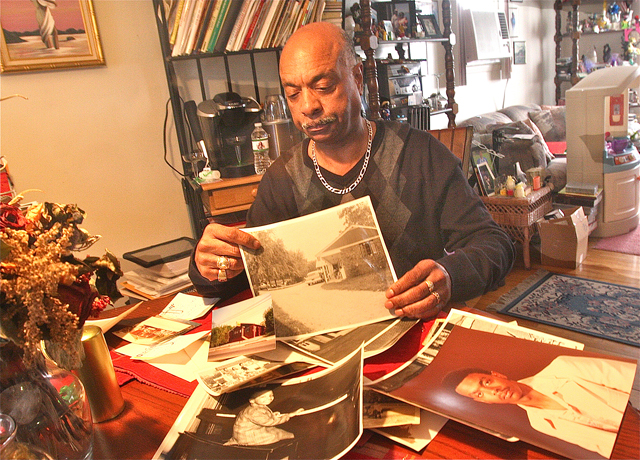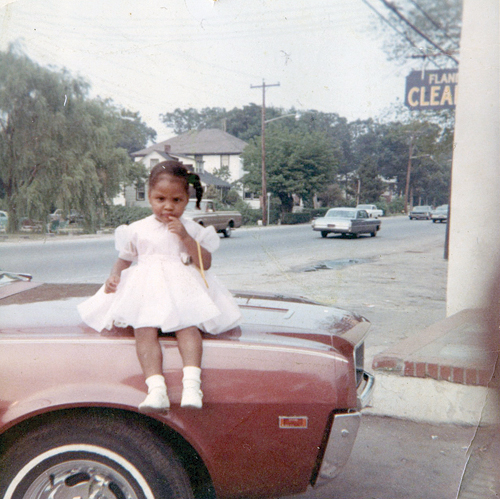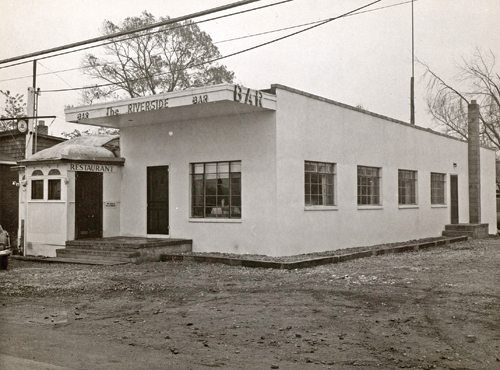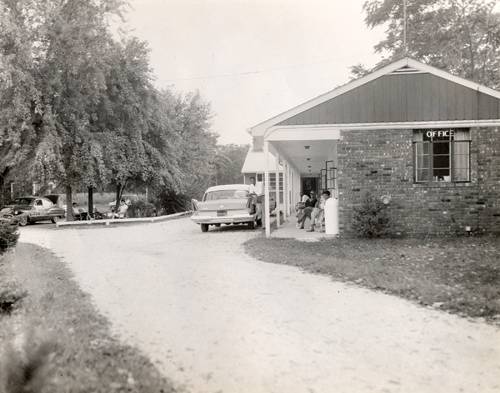A look back at a once ‘thriving community’ in Riverside


The weathered buildings lining much of the Flanders Road commercial district in Riverside, or what remains of it, appear to be listed for sale more than they’re open for business. Thick sheets of ice have consumed the parking lots of long-abandoned structures and rows of boarded windows seem interrupted only by the occasional barbershop or McDonald’s franchise.
It’s a sight David Peter Fitzgerald surmises would make his relatives, who opened several black-owned bars and motels in the once-industrious hamlet in the 20th century, roll in their graves.
“This was a thriving community,” said the 61-year-old Riverside native, who remembers the road he still lives on as being filled with successful African-American businesses. “They wouldn’t like it at all.”
Mr. Fitzgerald is also cautiously optimistic about current plans to revitalize the Riverside commercial corridor.
“We’ve heard this song and dance many times, so I’m still skeptical,” he said. “I want to see businesses. That’s my hope, to see it built up.”
If that were to happen, the area might once again be home to businesses like those Mr. Fitzgerald remembers.

THE BLUE BIRD INN
Despite its name, the Blue Bird Inn was more of a nightclub and employee boardinghouse than a place for passersby to rest their heads.
Established in 1929 by Mr. Fitzgerald’s paternal aunt, Willie Augusta Fitzgerald, and her husband, Jesse Shelton, the two-story structure featured natural wood walls and was popular among locals for the blues and jazz musicians it hosted — not to mention its soul food.
“They were famous for their fried pork chop sandwich and macaroni and cheese,” said Mr. Fitzgerald, who as a teenager was permitted to play drums at the Blue Bird on Sundays with his band, the Invader Juniors.
In March 1946, the Blue Bird Inn made headlines when Mr. Fitzgerald’s paternal uncle, Meriwell Fitzgerald, 35, was stabbed to death there after he ordered two African-American men who had brought their own alcohol into the bar to leave.
The suspects, Joseph Fleming, 26, and his brother, Leroy, 22, were charged with first-degree murder and later indicted on a charge of first-degree manslaughter. They were each sentenced to serve between five and 20 years in prison.
“My Uncle Meriwell had gotten out of the bar business; then my Uncle Jesse lured him back in,” Mr. Fitzgerald recalled. “And that’s when he got killed.”
Mr. Fitzgerald said race relations back then meant his family was probably content that the Fleming brothers went to prison at all, despite being convicted of the lesser crime of manslaughter.
“The fact that they went to jail, I guess they were satisfied with that at the time,” he speculated.
The Blue Bird Inn again received press in 1953, when a fire gutted the structure’s “entire interior and damaged the exterior,” according to a contemporary article from the Riverhead News-Review.
Despite the damage, the Sheltons continued to operate the Blue Bird Inn until their retirement in 1966.
Today, nothing remains of the Blue Bird Inn. The lot it once sat on is empty.

THE RIVERSIDE BAR AND GRILL
Three years after Meriwell Fitzgerald was killed, David Peter Fitzgerald’s parents, David and Lillian, opened the Riverside Bar and Grill.
Colloquially known as Dave’s Diner, the business operated from a long white building that still stands but has long been vacant.
In 1956, Pittsburgh native Madeline Cartwright began working at the restaurant during summers off from college.
“The Riverside Bar and Grill was a little more classy than the Blue Bird across the way,” recalled Ms. Cartwright, who is 78 and now lives in Philadelphia. “The Blue Bird was a little rougher and not as subdued as the diner.”
According to Mr. Fitzgerald, Dave’s Diner became famous for its fried chicken sandwich.
“Guys would have to get a chicken sandwich to go back home with for their wives to let them in the house,” he said with a laugh.

PETER’S MOTEL
In 1957, Mr. Fitzgerald’s parents opened Peter’s Motel, believed to be the first black-owned establishment of its kind on Long Island.
“It was named after me,” said Mr. Fitzgerald, whose father eventually built a house for his family behind the motel. “I was 3 years old.”
Located next door to Dave’s Diner, the 10-unit building survives and is now used as housing, said Mr. Fitzgerald. He began taking care of both properties with the help of his wife, Marianne, after his mother died in 1999.
“She was very, very proud,” Marianne Fitzgerald said of her mother-in-law. “She kept [the motel] neat: landscaped, flowers, beautiful. There were concrete benches around, a big rosebush. And she was always painting.”
Around 2004, Mr. Fitzgerald sold Dave’s Diner and the motel, along with his childhood home and a rental house on the property.
During its heyday, he said, Peter’s Motel was able to capitalize on the fact that Sunrise Highway hadn’t been extended yet.
“Everyone riding out to the Hamptons would have to stop here,” he said. “A few white people came, but mainly black.”
Hy-WAY 24 RESTAURANT
Frustrated with the lackluster service black people were receiving at other local eateries, Mr. Fitzgerald’s parents decided to open their final business, Hy-Way 24 Restaurant, in the early 1970s.
“It was supposed to open Feb. 24, 1972,” Mr. Fitzgerald said. “Everything was set up, the menus were on the tables. But on Feb. 21, I went into the bedroom and found my father dead.”
The site of Hy-Way 24, which the family did eventually open in 1973, is now occupied by the Mexican restaurant El Mariachi. Mr. Fitzgerald and his mother operated it until 1988, when the latter decided to retire.
“She said, ‘I’m tired,’ ” he recalled.

